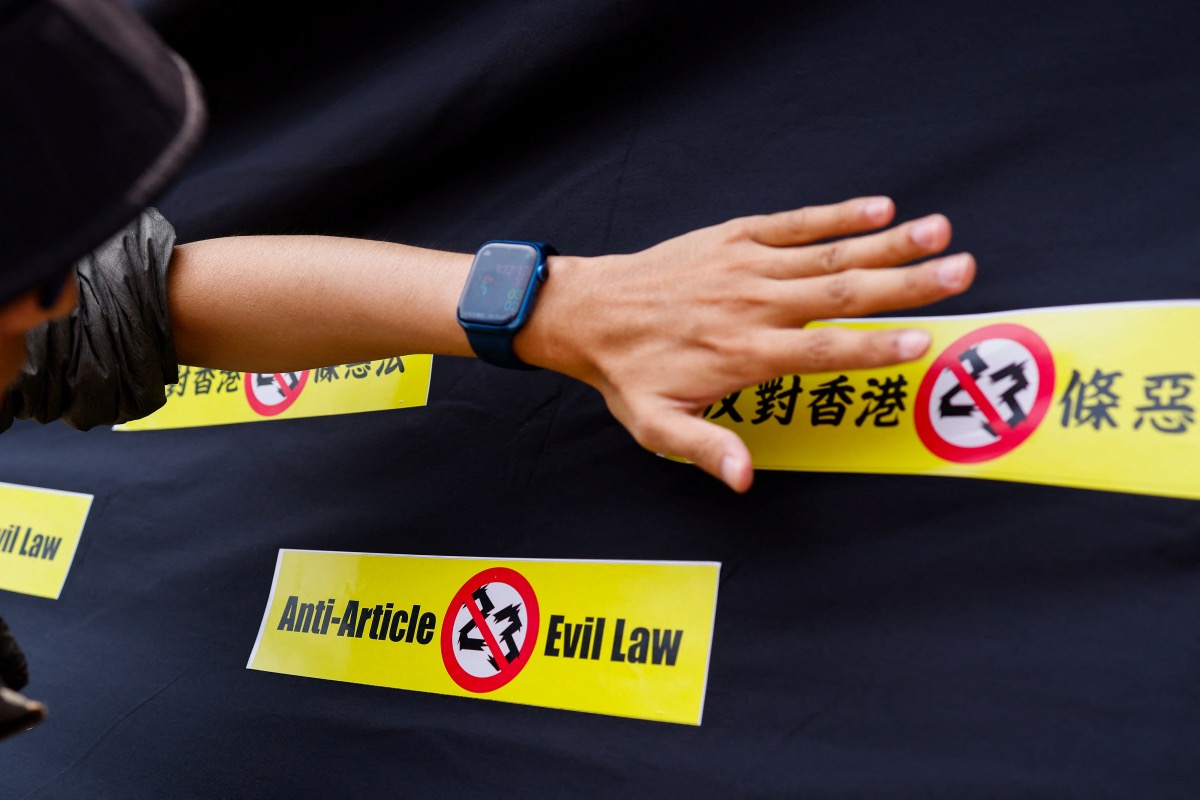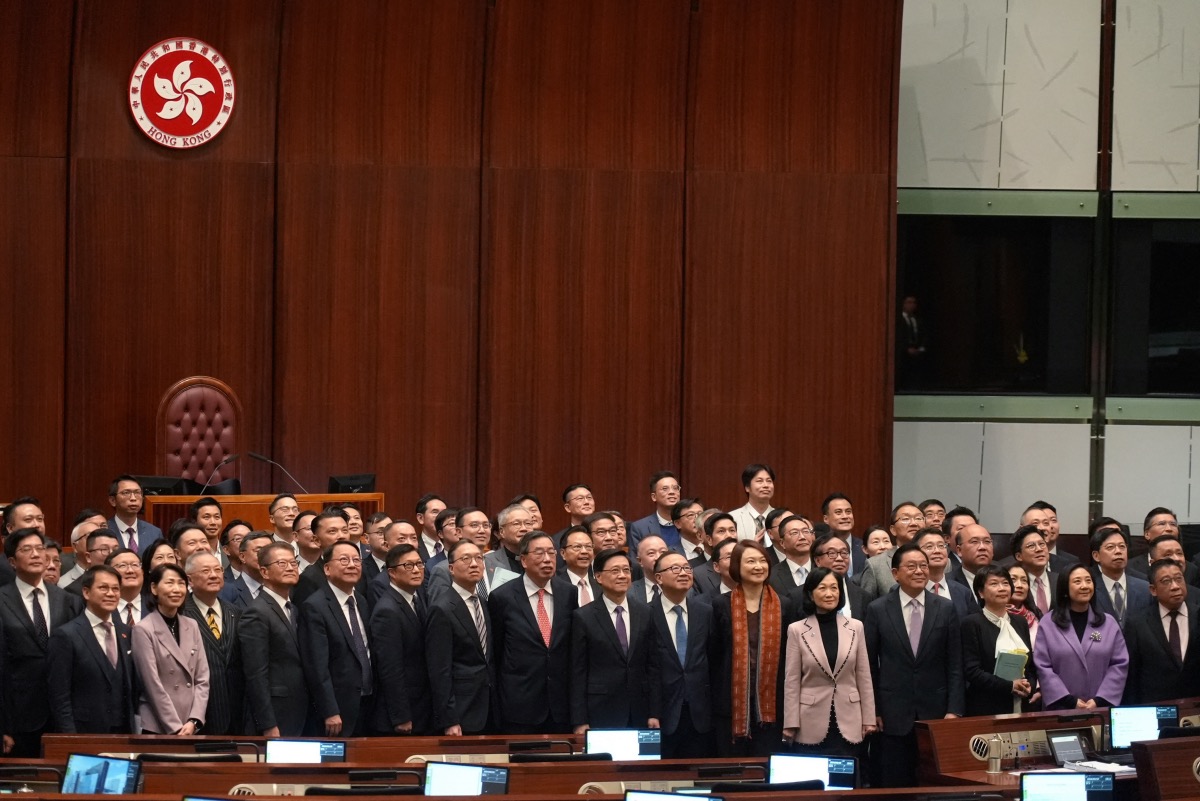Hong Kong, China
Reuters
A new national security law came into force in Hong Kong on Saturday despite growing international criticism that it could erode freedoms in the China-ruled city and damage its international financial hub credentials.
The law, also known as Article 23, took effect at midnight, days after Hong Kong’s pro-Beijing lawmakers passed it unanimously, fast-tracking legislation to plug what authorities called national security loopholes.

A volunteer posts an anti-Article 23 national security law sticker on a black fabric as part of a global protest in Taipei, Taiwan, on 23rd March, 2023. PICTURE: Reuters/Ann Wang
Hong Kong Chief Executive John Lee said the law “accomplished a historic mission, living up to the trust placed in us by the Central [Chinese] Authorities”.
The United States expressed concerns that the law would further erode the city’s autonomy and damage its reputation as an international business hub.
“It includes vaguely defined provisions regarding ‘sedition,’ ‘state secrets,’ and interactions with foreign entities that could be used to curb dissent,” US Secretary of State Antony Blinken said in a statement.
Australia and Britain on Friday criticised the law after a bilateral meeting in Adelaide, expressing “deep concerns about the continuing systemic erosion of autonomy, freedoms and rights” in Hong Kong.
The United Nations and the European Union recently noted the extremely swift passage of the law with limited public consultation, by a legislature overhauled in recent years to remove opposition democrats.
Australia, Britain and Taiwan updated their travel advisories for Hong Kong, urging citizens to exercise caution.
“You could break the laws without intending to and be detained without charge and denied access to a lawyer,” the Australian government said.
Hong Kong authorities, however, “strongly condemned such political manoeuvres with skewed, fact-twisting, scaremongering and panic-spreading remarks.”
Hong Kong, a former British colony, returned to Chinese rule in 1997 with the guarantee that its high degree of autonomy and freedoms would be protected under a “one country, two systems” formula.
In recent years, many pro-democracy politicians and activists have been jailed or have gone into exile, and liberal media outlets and civil society groups have been shut down.

Hong Kong Chief Executive John Lee, government officials and lawmakers pose for a group photo, after the Safeguarding National Security Bill, also referred to as Basic Law Article 23, was passed at the Hong Kong’s Legislative Council, in Hong Kong, China, on 19th March, 2024. PICTURE: Reuters/Joyce Zhou
In a joint statement led by the overseas-based Hong Kong Democracy Council, 145 community and advocacy groups condemned the law and called for sanctions on Hong Kong and Chinese officials involved its passage, as well as review the status of Hong Kong’s Economic & Trade Offices worldwide.
“It’s time for the United States to step up for political prisoners and freedom in Hong Kong. Every time we let authoritarians get away with atrocities, we risk other bad actors attempting to do the same,” wanted Hong Kong activist Frances Hui said in Washington, during a news conference with the US Congressional-Executive Commission on China (CECC), which advises Congress.
Chris Smith, a co-chairman of the CECC, said the Hong Kong trade offices had “simply become outposts of the Chinese Communist Party, used to engage in transnational repression”.
China defends the security crackdown as essential to restoring order after months of sometimes violent anti-government and pro-democracy protests in 2019.
About 291 people have been arrested for national security offences, with 174 people and five companies charged so far.
We rely on our readers to fund Sight's work - become a financial supporter today!
For more information, head to our Subscriber's page.
Chinese authorities insist all are equal before the security laws that have restored stability, but while individual rights are respected no freedoms are absolute.
A previous attempt to pass Article 23 was scrapped in 2003 after 500,000 people protested. This time around, public criticism has been muted amid the security crackdown.
In Taipei’s fashionable Ximending shopping district, more than a dozen Hong Kong, Taiwan and Tibet activists gathered to protest the law and shout their denunciations.
In London, more than a hundred protesters passed through Chinatown.
They included activist Finn Lau, against whom the Hong Kong police have issued an arrest warrant. “We are here to [protest] against that legislation and we request the Foreign Office and the UK Government to impose sanctions against Hong Kong officials,” he told Reuters.
Other protests were planned in Australia, Canada, Japan and the United States.
– With reporting by BEN BLANCHARD in Taipei, Taiwan; additional reporting by COSTAS PITAS and DAVID BRUNNSTROM in Washington DC, US; HOLLIE ADAMS and YANN TRESSOER in London, UK






